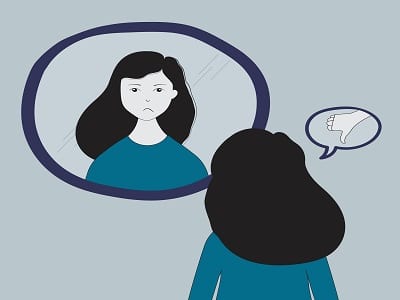Did you know that there are a number of mental health conditions associated with body dysmorphia? This is a disorder that causes people to have a distorted view of their bodies, often seeing themselves as much worse than they actually are. This can be an extremely damaging condition, leading to low self-esteem, depression, and even suicide in some cases. In this blog post, we will discuss some different types of body dysmorphia-related mental health conditions. If you think you may be suffering from one of these conditions, please seek professional help immediately.
Contents
What Is Body Dysmorphia?
 Body dysmorphia is a mental health condition that causes a person to have a distorted view of their body. People with this condition may see themselves as overweight, even when they are not. They may also believe that they are ugly or deformed in some way.
Body dysmorphia is a mental health condition that causes a person to have a distorted view of their body. People with this condition may see themselves as overweight, even when they are not. They may also believe that they are ugly or deformed in some way.
Body dysmorphia can lead to a number of other mental health conditions, such as anxiety and depression. It can also cause people to engage in risky behaviors, such as using drugs or alcohol or starving themselves.
The exact cause of body dysmorphia is unknown. However, it is thought to be related to a combination of genetic and environmental factors. Treatment for body dysmorphia usually involves therapy and medication.
If you think you may have body dysmorphia, it is important to talk to a doctor or mental health professional. They can help you get the treatment you need to improve your quality of life.
Different Body Dysmorphia-Related Mental Health Conditions

There are many different mental health conditions that can be associated with body dysmorphia. Some of the most common include anxiety disorders, eating disorders, and depression.
Anxiety Disorders
People with body dysmorphia often suffer from anxiety disorders. This is because they are constantly worried about their appearance and how others perceive them. They may have a fear of social situations and avoid them altogether. This related condition is called social anxiety disorder.
Eating Disorders
Another mental health condition that is often associated with body dysmorphia is an eating disorder. This is because people with body dysmorphia are usually very critical of their bodies and may think that they are overweight, even when they are not. As a result, they may develop an eating disorder such as anorexia nervosa or bulimia nervosa in an attempt to lose weight.
Depression
Depression is another common mental health condition that can be associated with body dysmorphia. This is because people with this condition often have a negative view of themselves and their bodies. They may feel hopeless and helpless, which can lead to depression. Also, depression may also be the result of the social isolation that people with body dysmorphia experience.
OCD
OCD is another mental health condition that can be associated with body dysmorphia. This is because people with this condition often have very strict routines and rituals that they follow in order to make sure that their bodies are perfect. For example, someone with OCD may wash their hands over and over again or check their appearance in the mirror dozens of times each day.
Negative Impacts of Body Dysmorphia-Related Mental Health Conditions

There can be many negative impacts of having a mental health condition related to body dysmorphia. Some of these are:
Problems At Work
One of the most common problems people with body dysmorphia face is dealing with work. This can be due to many different things such as taking too much time off, not being able to concentrate, or even calling in sick because of anxiety about how they look.
Problems With Friends And Family
Another issue that often comes up is problems with friends and family. This can be anything from not wanting to see them because you’re afraid of what they might say, to feeling like you have to keep up a certain appearance around them. There are constant pressures to look a certain way and it can be very tough to deal with.
Problems In Relationships
Body dysmorphia can also have a major impact on a person’s personal relationships. This is because you may not want to be intimate with your partner, or you may feel like you’re not good enough for them. It can put a lot of strain on a relationship if one person is constantly worrying about their appearance.
Isolation
Many people who suffer from body dysmorphia also start to isolate themselves from the world. This can be done by staying indoors all the time, only going out when it’s absolutely necessary, or even avoiding social media.
Constant Worrying
Another big problem is that people with body dysmorphia are always worrying about their appearance. This can lead to a lot of stress and anxiety, which can then have an impact on other areas of your life.
As you can see, there are many negative impacts of having a mental health condition related to body dysmorphia. If you think you may be suffering from this condition, it’s important to seek help from a professional. They will be able to diagnose you and provide the necessary treatment.
Treatment of Body Dysmorphia-Related Mental Health Conditions

There are many ways to treat the mental health conditions associated with body dysmorphia. Some people may need medication to help manage their symptoms, while others may benefit from therapy or a combination of both.
Some of these methods of treatment are:
Medications
One of the most common treatments for mental health conditions is medication. There are many different types of medications that one can definitely use to treat the symptoms of body dysmorphia, such as antidepressants, anti-anxiety medications, and antipsychotic medications.
Therapy
Another popular treatment option for mental health conditions is therapy. There are many different types of therapy that can be helpful for people with body dysmorphia, such as cognitive behavioral therapy, exposure therapy, and dialectical behavior therapy.
Self-Care
In addition to medication and therapy, self-care is also an important part of treating mental health conditions. Some self-care activities that can be helpful for people with body dysmorphia include exercise, relaxation techniques, and healthy eating.
Support Groups
Another method of treatment that can be helpful for mental health conditions is support groups. There are many different types of support groups available, such as online support groups, in-person support groups, and 12-step programs.
If you or someone you know is struggling with a mental health condition, there are many resources available to help. Treatment options vary depending on the individual and the severity of their symptoms, but there are many ways to get help.
Conclusion
Body dysmorphia is a serious mental health condition that can lead to devastating consequences. If you think you might have body dysmorphia, it’s important to seek professional help. Treatment for body dysmorphia typically includes cognitive-behavioral therapy and, in some cases, medication. With treatment, people with body dysmorphic disorder can learn to manage their symptoms and improve their quality of life. If you or someone you know is struggling with body dysmorphic disorder, there are resources available to help.
Hope this article was of help to you! If you are suffering from OCD facts, you may seek help from Therapy Mantra. We have a team of highly trained and experienced therapists who can provide you with the tools and skills necessary for overcoming OCD. Contact us today to schedule an online therapy or download our free OCD treatment app on Android or iOS for more information.


